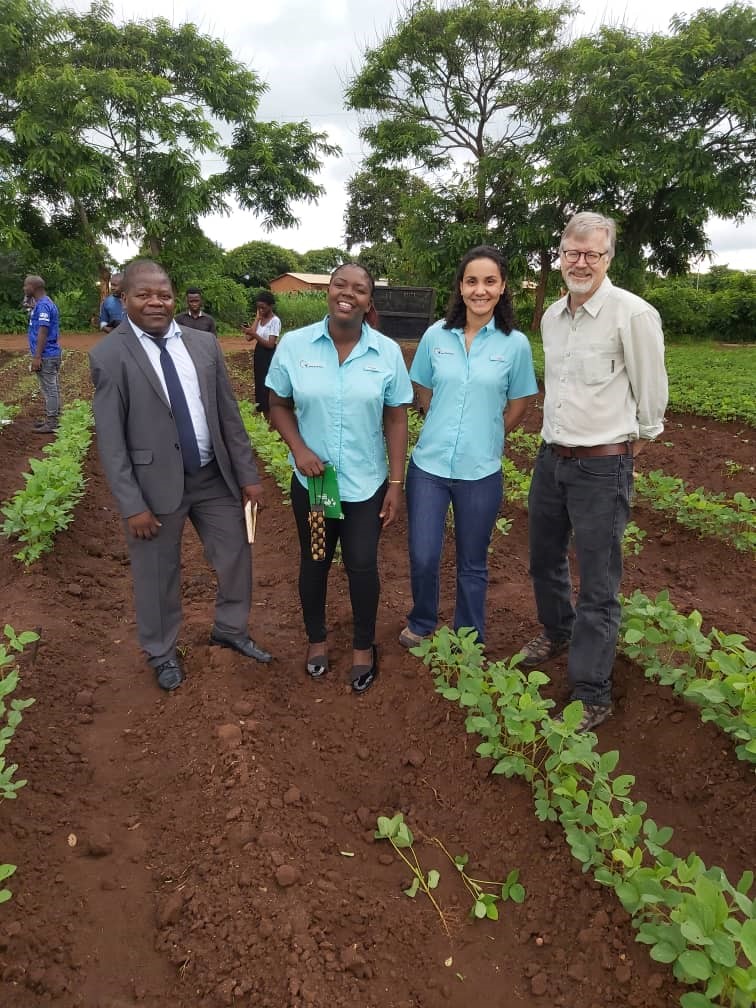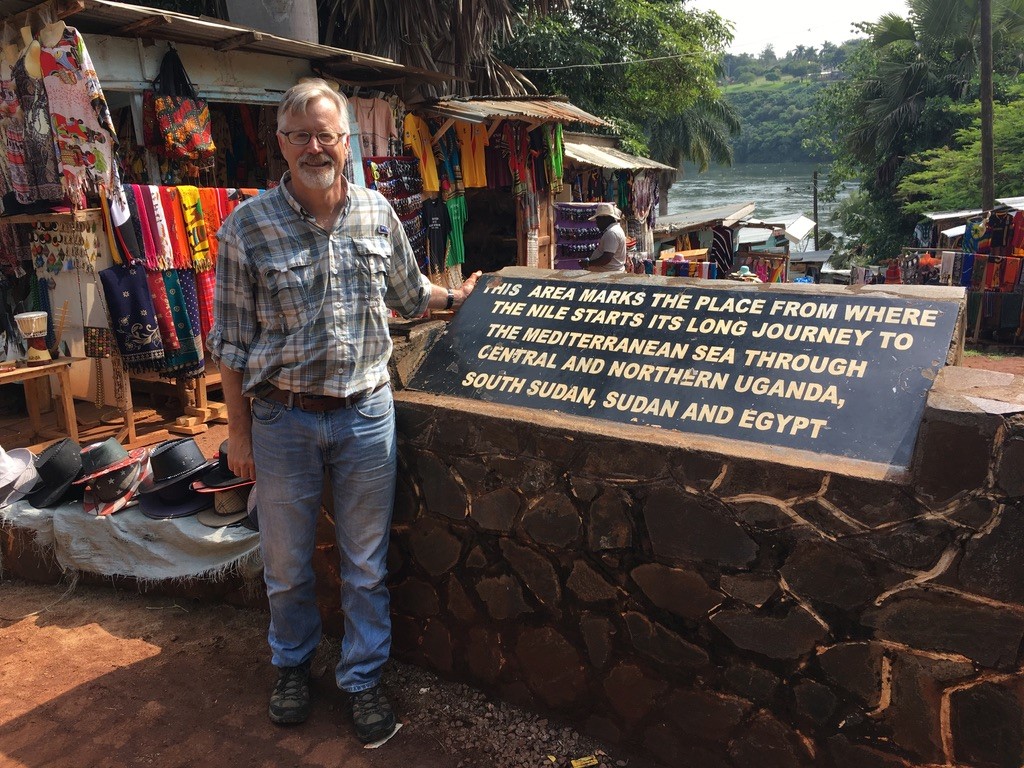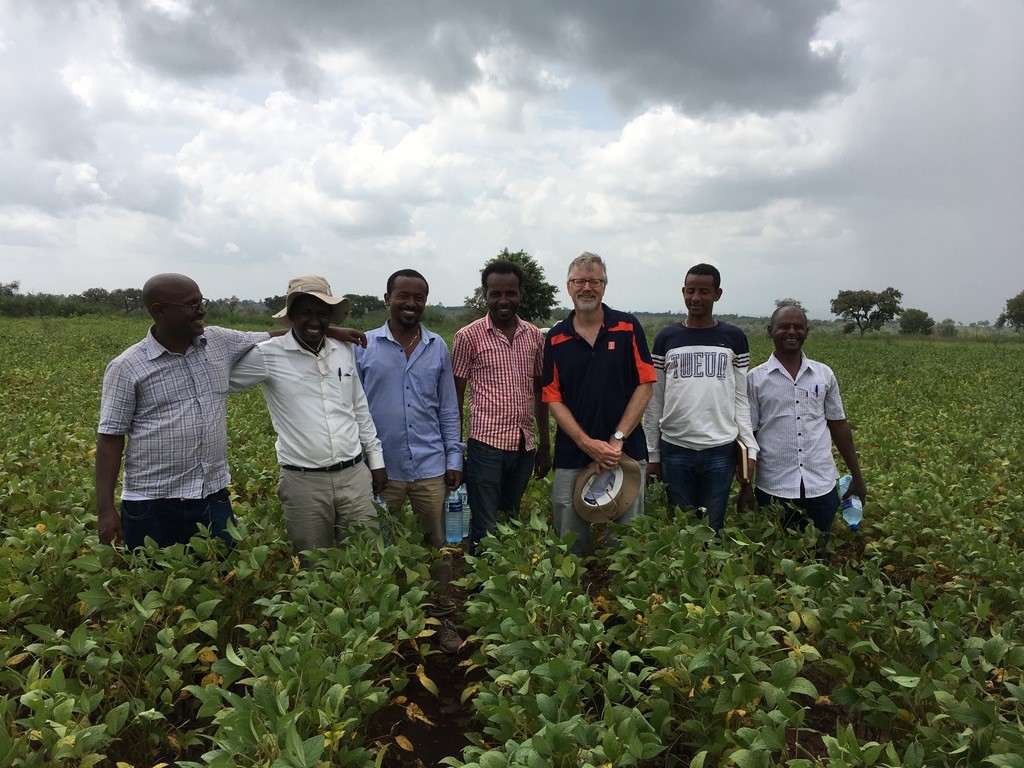
Dr. Brian Diers (right) at a research location near Lilongwe, Malawi.
Many people embarking on their retirement years may be looking forward to more time in the slow lane, but not Dr. Brian Diers, professor emeritus at the University of Illinois. After retiring in December 2022, Diers is excited to focus more time working with plant breeders in Africa to help them develop soybean varieties adapted to the diverse environments there. The goal of his project is to develop varieties for smallholder farmers to diversify their crop mix, add a high-protein food source for their families, and provide them with a cash crop that can enhance food stability across Africa.
“Soybean is an important source of protein and oil worldwide. I am proud to contribute to the improvement of the crop,” Diers said. “There is no other crop that produces as much protein on a per-acre basis than soybean, and this protein is needed to feed a growing population.”
Before Diers shifted his focus, he helped transition the SOYLEIC breeding program to its new shepherd, Dr. Eliana Monteverde. Monteverde inherits a breeding program that brings together plant breeders across the Midwest to develop varieties with high oleic and low linolenic acid. This involves evaluating approximately 13,000 experimental lines across Illinois each year. That number shrinks in subsequent generations, with about 10 percent making the cut each year until there are a handful of lines remaining that look good enough to release as varieties.
“Our main focus has been to develop high-yielding varieties adapted to Illinois with the SOYLEIC trait,” Diers explained. “During the past couple of years, I have been happy to see that our best SOYLEIC varieties are matching the yields of check varieties from the commercial sector. These SOYLEIC varieties are being licensed to companies for commercial production. We’re hopeful there will be enough seed of some varieties for significant sales to growers next year.”
A new focus on food stability
With the SOYLEIC program in the capable hands of Monteverde, Diers can now devote more time to the U.S. Agency for International Development-funded Soybean Innovation Lab project let by the University of Illinois.
“The goal is to help small farmers produce enough so they can provide good nutrition for their families and neighbors, as well as have some left for a cash crop that provides income to pay for medicine, school fees, and other expenses,” Diers explained.

Dr. Diers traveled to a site where the Nile flows from Lake Victoria, which he visited on a trip to field locations in Uganda.
Diers has his work cut out for him. There are few soybean varieties adapted to African environments, yields average just 15 bu/A, and existing North and South American varieties do not perform well there. Various environmental factors are at play, including day length sensitivity, soil types and rainfall.
Collaboration on this project involves two to three trips each year plus frequent virtual meetings. The primary research center Diers collaborates with is the International Institute for Tropical Agriculture. This institute has one breeder in Nigeria who focuses on western Africa and a second breeder in Zambia who concentrates on southern Africa. Diers also works with breeders in Ethiopia, Uganda and Ghana.
“We are also organizing variety testing in more than 20 countries in Africa,” Diers said. “The testing program is needed so varieties can be identified that perform well in countries that don’t have breeding programs.”
How it all began
The joy Diers finds in soybean breeding was sparked in his early days growing up on a Minnesota farm. He enjoyed botany and genetics in college and saw plant breeding as a way to combine those interests while having a direct impact on farmers. “I got into soybean breeding by chance because the best offer for a graduate assistantship was in soybean breeding,” he said.
Diers earned his undergrad at the University of Minnesota and MS and PhD at Iowa State University. He did a postdoctoral at the University of Wisconsin and served as a faculty member and soybean breeder at Michigan State University before becoming a soybean breeder with the University of Illinois where he spent his past nearly 25 years. Some of his accolades include:
- Fellow of the American Association of the Advancement of Science
- Fellow of the Crop Science Society of America and American Society of Agronomy
- Paul A. Funk Recognition Award, College of Agricultural, Consumer and Environmental Sciences, University of Illinois.
- Author or coauthor of more than 150 peer-reviewed research publications
- Mentor to 25 graduate students and 13 postdoctoral researchers in the College of Agricultural, Consumer and Environmental Sciences at the University of Illinois
- Released over 30 varieties, mostly for the non-GMO market

Dr. Diers visits a research location near Pawe, Ethiopia.




 and then
and then